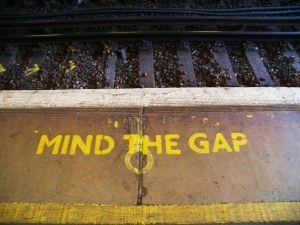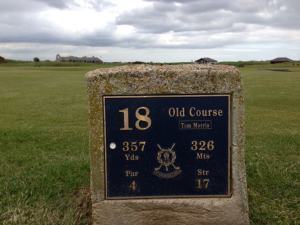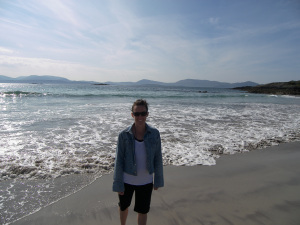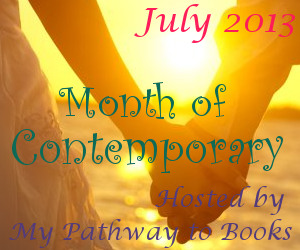D.R. Graham's Blog, page 6
November 9, 2013
Why I wear a poppy.

Canadian RAF Spitfire pilot William Aldcorn rescued after shot down in WWII
Some people are vowing not to wear poppies anymore. They claim that those who wear the poppy support war, that politicians use the symbol to justify military action, and that there is no point in remembering something that happened such a long time ago.
Before I explain why I wear a poppy, please watch the short video below.
This is the newsreel that captured footage of my Grandfather’s Spitfire plane being shot down during WWII. He was pulled from the water by sailors on a Dutch merchant ship.
 This is a photo of my Great Uncle Vern.
This is a photo of my Great Uncle Vern.
He was nineteen years old when he was killed.
I wear a poppy because I don’t ever want to take my freedoms for granted.
I wear a poppy because I don’t ever want an entire generation of young people to be sent to a war that will result in either their death, or if they survive, a lifetime of post traumatic stress.
I wear a poppy to show my appreciation to the Dutch sailors who saved my Canadian Grandfather. Without their efforts I would not be here today.
I wear a poppy to be solemnly reminded that my Uncle Vern never returned home.
I wear a poppy to remember that war is a horrible thing and peace is something we need to work to preserve.







November 8, 2013
Anti-bullying initiatives aren’t working?
 The problem of bullying is a complicated issue. It hits a nerve with everybody who has been the target of bullying, it makes bystanders uncomfortable, and it is a problem that can have very dire consequences if it is not dealt with. Unfortunately, nobody really knows how to deal with all of its intricate layers at once.
The problem of bullying is a complicated issue. It hits a nerve with everybody who has been the target of bullying, it makes bystanders uncomfortable, and it is a problem that can have very dire consequences if it is not dealt with. Unfortunately, nobody really knows how to deal with all of its intricate layers at once.
People want a quick fix to stop bullying, but there isn’t one simple solution because there isn’t just one reason why people are victimized, and there isn’t just one reason why people bully. The problem exists in the home, in the media, on the sports field, in the schools, and in the community. It will require a shift in all environments in order to see a change.
Some anti-bullying initiatives, such as those that encourage and empower the bystanders to join forces and declare that bullying behaviour is not okay, are seeing a slight reduction in bullying. Other initiatives result in no change. Sometimes it’s because a one-size-fits-all program won’t work on every demographic. Sometimes it’s because the initiatives aren’t tackling the correct problem.
Is the problem a tormentor who has impulse control issues and comes from an abusive or troubled home? Is the problem an emotionally fragile or socially awkward victim who inadvertently invades others’ personal space or unwittingly provokes a hostile reaction? Is the problem a culture of competitiveness where aggression and overpowering those who are weaker is rewarded with status and power? Is it something else entirely?
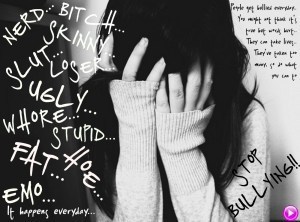 Every student in our school district participates in anti-bullying campaigns each year. They wear their pink shirts and blue bracelets and learn that bullying is bad, so why does social aggression still happen every single day?
Every student in our school district participates in anti-bullying campaigns each year. They wear their pink shirts and blue bracelets and learn that bullying is bad, so why does social aggression still happen every single day?Let’s start with a clarification of the definitions. Social aggression includes everything that we would consider mean or rude: name-calling, teasing, exclusion, inappropriate jokes, threats, and physical aggression. Bullying is repeated, socially aggressive behaviour intended to damage people, physically or mentally, so they will submit or retreat.
The vital distinctions between social aggression and bullying are that social aggression is a method for establishing boundaries, appropriate behaviour in a group, and hierarchy. Bullying is the REPETITIVE, HUMILIATING use of social aggression that results in SUBMISSION by the victim.
Thanks to anti-bullying campaigns, young students call all social aggression bullying. “She invited everybody to her birthday except me”, “He wouldn’t let me play defence and pushed me in the mud”, “She always chooses Chelsea instead of me”, “They wouldn’t use my idea in a group project and said it was stupid”.
Although upsetting, everyday social aggression is not bullying. Conflict teaches children how to solve problems, how to cope, and it builds resiliency. Children need to experience situations where they are pushed around or challenged. Solving conflicts on their own is necessary in order to grow and build the skills to survive in a social world that has rules, competition, boundaries, and a hierarchical structure.
Bullying, on the other hand, should not be allowed to exist under any circumstances. The difficult part in eradicating the more severe harassment is that a victim of real bullying will almost never talk about it because it is incredibly humiliating and scary. “The girls who I thought were my friends photo shopped my face onto a pornographic picture and posted it online with my phone number”, “A grade twelve student peed in my locker and told me if I don’t sell weed for him he’ll hurt my little sister”, “A girl I don’t even know told me to stop dating the guy she likes or she’ll jump me, and she’s waits outside my school every day with a bunch of her friends”.
If we want bullying to stop, we first need to stop governing with it, conducting business with it, and laughing at it. The television program GLEE
 prides itself on tackling topics like bullying, while hypocritically the characters say things to each other like, “Rachel, your moustache is thicker than a Middle Eastern dictator”, “Read my lips because we know you can’t read words”, “All I want is just one day a year when I’m not visually assaulted by uglies and fatties… if you’re hideous stay at home.”, “Wheels, Gay Kid. Come on, move it! Asian, other Asian, Aretha, and Shaft”, and “…your finger-licking, lard-loving, Gilbert Grape-looking mama”.
prides itself on tackling topics like bullying, while hypocritically the characters say things to each other like, “Rachel, your moustache is thicker than a Middle Eastern dictator”, “Read my lips because we know you can’t read words”, “All I want is just one day a year when I’m not visually assaulted by uglies and fatties… if you’re hideous stay at home.”, “Wheels, Gay Kid. Come on, move it! Asian, other Asian, Aretha, and Shaft”, and “…your finger-licking, lard-loving, Gilbert Grape-looking mama”.Why do we laugh at that and give the show awards? Humiliation isn’t funny, and laughing at the expense of someone who has been humiliated makes it unlikely that the person will ever talk about it.
In order for a culture of bullying to change, we need to teach children to put a stop to humiliating and intimidating behaviour immediately, even if that requires them to be rude or socially aggressive. We need to teach children to stand up for themselves in a strong but non-violent way - because in their lifetime, they will likely be harassed, threatened, intimidated, hurt, or the topic of rumours. We need to teach them the difference between bullying and social aggression. And, we need to support any child who is emotionally vulnerable and at-risk of becoming a victim or a bully. Most importantly, we as adults need to question what we laugh at, what we encourage, and what we role model.
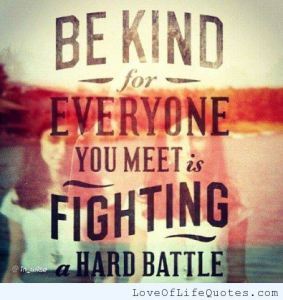
-Danielle Aldcorn







October 1, 2013
RUINED by Jus Accardo: New Adult Book Cover Reveal
Cover Reveal
RUINED by Jus Accardo
Release Date: November 11th, 2013
Hi Everyone!
The publisher for my upcoming New Adult release has revealed the cover for Jus Accardo’s RUINED. Check it out and share with all your New Adult fan friends. The release date for RUINED is November, 11th 2013. Stay tuned for my cover reveal. It’s coming soon!
Hell is looking for a way to break loose…
Jax lost the genetic lottery. Descended from Cain, the world’s first murderer, he’s plagued by a curse that demands violence in exchange for his happiness. He left everything behind, including the girl he loved, but thriving on the pain of others is lonely… And it’s killing him.
After a series of heartbreaking losses, Samantha put rubber to pavement and headed for college as fast as her clunker could carry her. But she can’t outrun her problems. When an attack at school drives her back home, she’s thrown into the path of a past—and a guy—she’s been trying to forget.
Sam strains Jax’s control over his darkness, but running isn’t an option this time. Someone—or, something—followed her home from school: a ruthless monster with a twisted plan centuries in the making. Forced together to survive, and fighting an attraction that could destroy them both, Jax and Sam must stop a killer bent on revenge.
Jus Accardo
JUS ACCARDO spent her childhood reading and learning to cook. Determined to follow in her grandfather’s footsteps as a chef, she applied and was accepted to the Culinary Institute of America. At the last minute, she realized her path lay with fiction, not food, and passed on the spot to pursue writing. Jus is the bestselling author the popular Denazen series from Entangled publishing. A native New Yorker, she lives in the middle of nowhere with her husband, three dogs, and sometimes guard bear, Oswald.
Check her out!







September 11, 2013
Does police bashing prevent police brutality?
A friend of mine recently posted a link to a controversial article written by the wife of an RCMP officer. She examined the tendency for the public to automatically finger point and blame the police. She acknowledged that although there are few bad apples in the policing field, most members are working very hard to serve and protect and make it home alive at the end of the shift.

Many of the comments on her article were supportive. They respected that men and women in first responder professions risk their lives every day and that they are put in positions where their decisions or mistakes might have dire consequences. 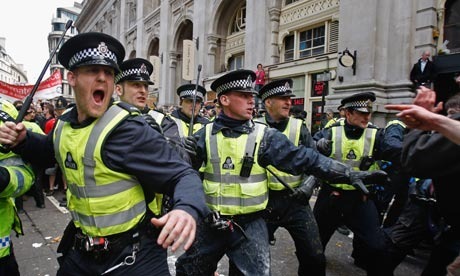 The author’s main point was that the public shouldn’t judge a situation that they know very little about, or automatically blame the police when they don’t know what led up to the decision that the officer made.
The author’s main point was that the public shouldn’t judge a situation that they know very little about, or automatically blame the police when they don’t know what led up to the decision that the officer made.
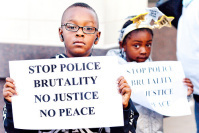 The other side of the comments on her article ranged from people pointing out that police brutality exists, to extremely hostile, police-bashing, angry-at-the-man type sentiments. She eventually had to close the comments when individuals threatened her and wished that her police officer husband would beat her to death.
The other side of the comments on her article ranged from people pointing out that police brutality exists, to extremely hostile, police-bashing, angry-at-the-man type sentiments. She eventually had to close the comments when individuals threatened her and wished that her police officer husband would beat her to death.
As I read through the progressively more disturbing comments, something occurred to me.
Regardless of your opinions about the police, we can all agree that there needs to be more accountability. I don’t mean holding a person or group accountable; I mean being personally accountable. 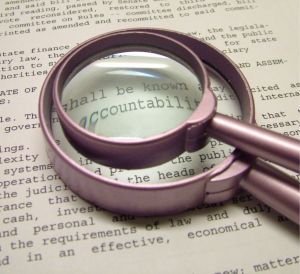
Whether we are bureaucrats, corporation heads, teachers, parents, or blue-collar workers we can all be more accountable for our behaviours and choices - both the ones we make and the ones we don’t. This would include what we say or stay silent on, how we spend our money and time, our attitude, what we consider important, and whether we jump to blame or jump to find solutions.
We are all responsible to act the way we would if we knew everybody was watching, even when nobody is watching. We are all responsible to respect other people’s things, families, beliefs, and lifestyles as if they were our own. We are responsible to ensure the safety and well-being of our fellow humans, whether that means protecting the environment, speaking up against an injustice, or simply being honest and trustworthy.
Personal accountability is fairly simple: work hard to be a person others would admire; adhere to the law or run for office to change the law; admit when we make mistakes; accept the consequences when we slack, break a rule, or screw up; exercise our right to vote so the people we want representing us are elected; appreciate and value the people who are trained and willing to do the difficult or dirty jobs that we can’t or don’t want to do.
Everybody is where they are today because of the choices they made yesterday. If you commit a crime you will be treated like a criminal. That is the choice you made and it’s not a police officer’s fault that you made that choice. On the other hand, if you are in a position of authority and you abuse the privilege or power that has been entrusted in you, you shouldl lose that position of authority.

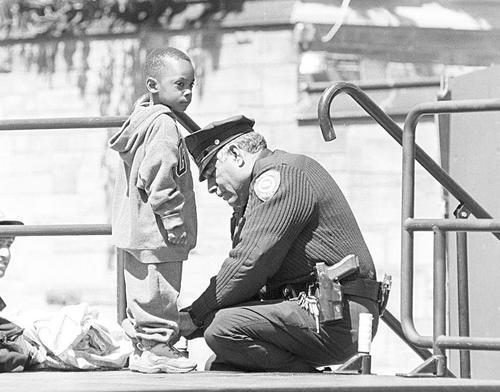
I’m glad there are men and women who are willing to be spit on, attacked, and threatened with weapons as their profession. Sure, some police officers are corrupt or lack integrity; some have been on the traumatizing and sometimes thankless job too long; some have personal problems that affect their judgement; and some abuse the authority they have been entrusted with. Most of them are individuals who are caring, responsible, brave, and calm in threatening situations.
If we cop bash, the type of young men and women who we need in policing will think twice about choosing that profession.
Instead of bashing, let’s all work on being accountable to ourselves first.
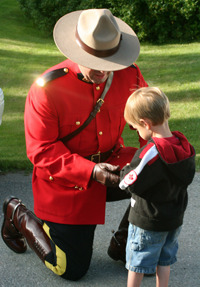
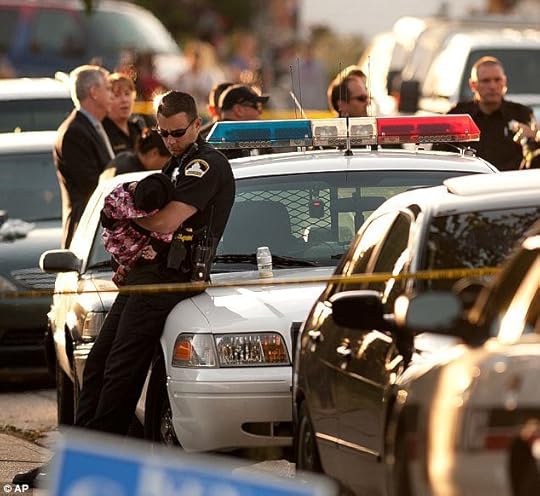







Who are you accountable to?
A friend of mine recently posted a link to a controversial article written by the wife of an RCMP officer. She examined the tendency for the public to automatically finger point and blame the police. She acknowledged that although there are few bad apples in the policing field most members are working very hard to serve and protect and make it home alive at the end of the shift.

Many of the comments on her article were supportive. They respected that men and women in first responder professions risk their lives every day and that they are put in positions where their decisions or mistakes might have dire consequences.  The author’s main point was that the public shouldn’t judge a situation that they know very little about, or automatically blame the police when they don’t know what led up to the decision that the officer made.
The author’s main point was that the public shouldn’t judge a situation that they know very little about, or automatically blame the police when they don’t know what led up to the decision that the officer made.
 The other side of the comments on her article ranged from people pointing out that police brutality exists to extremely hostile, police-bashing, angry-at-the-man type sentiments. She eventually had to close the comments when individuals threatened her and wished that her police officer husband would beat her to death.
The other side of the comments on her article ranged from people pointing out that police brutality exists to extremely hostile, police-bashing, angry-at-the-man type sentiments. She eventually had to close the comments when individuals threatened her and wished that her police officer husband would beat her to death.
As I read through the progressively more disturbing comments, something occurred to me.
Regardless of your opinions about the police, we can all agree that there needs to be more accountability. I don’t mean holding a person or group accountable; I mean being personally accountable. 
Whether we are bureaucrats, corporation heads, teachers, parents, or blue-collar workers we can all be more accountable for our behaviours and choices - both the ones we make and the ones we don’t. This would include what we say or stay silent on, how we spend our money and time, our attitude, what we consider important, and whether we jump to blame or jump to find solutions.
We are all responsible to act the way we would if we knew everybody was watching, even when nobody is watching. We are all responsible to respect other people’s things, families, beliefs, and lifestyles as if they were our own. We are responsible to ensure the safety and well-being of our fellow humans, whether that means protecting the environment, speaking up against an injustice, or simply being honest and trustworthy.
Personal accountability is fairly simple: work hard to be a person others would admire; adhere to the law or run for office to change the law; admit when we make mistakes; accept the consequences when we slack, break a rule, or screw up; exercise our right to vote so the people we want representing us are elected; appreciate and value the people who are trained and willing to do the difficult or dirty jobs that we can’t or don’t want to do.
Everybody is where they are today because of the choices they made yesterday. If you commit a crime you will be treated like a criminal. That is the choice you made and it’s not a police officer’s fault that you made that choice. On the other hand, if you are in a position of authority and you abuse the privilege or power that has been entrusted in you, you will lose that position of authority.


I’m glad there are men and women who are willing to be spit on, attacked, and threatened with weapons as their profession. Sure, some police officers are corrupt or lack integrity; some have been on the traumatizing and sometimes thankless job too long; some have personal problems that affect their judgement; and some abuse the authority they have been entrusted with. Most of them are individuals who are caring, responsible, brave, and calm in threatening situations.
If we cop bash, the type of young men and women who we need in policing will think twice about choosing that profession. Let’s all be accountable to ourselves first.









August 9, 2013
Sometimes the NECESSARY HELPFUL TRUTH tastes bad and is hard to swallow
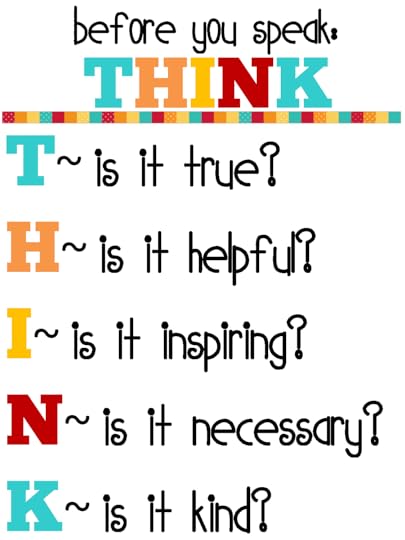
There are two basic problems that occur in our communications with each other. One is that we said something we shouldn’t have said. The other is that we didn’t say something we should have said.
In elementary schools there are posters with THINK printed on them to remind children what they should consider before they speak. The T reminds us to ask ourselves whether what we are about to say is TRUE. If you spread a rumour, lie, or share an inaccurate fact, who benefits? Likely the only person who benefits is you, and in most cases that benefit will be only short-lived until the rumours come back around or the lies catch up to you. If it’s not true, don’t say it. If you’re not sure whether it’s true, check your facts then check the next point before you share it.
The H reminds us to ask ourselves whether what we are about to say is HELPFUL. There are many TRUE statements that are not HELPFUL to share. For example, if you walk into someone’s house and say, “Wow, looks like you haven’t had any time to do housework,” this may be true, but saying it serves no helpful purpose.
The I reminds us to ask ourselves whether what we are about to say is INSPIRING. I actually prefer the word encouraging, but since THINK is not spelled with an E they went with INSPIRING. The choice of words and the delivery are what makes a message encouraging. The helpful and true components of the message will be ignored if it’s discouraging.
The N reminds us to ask ourselves whether what we are about to say is NECESSARY. What you say should serve a purpose: to make someone’s life easier, safer, happier, fix a problem, design a plan, inform, or entertain. It’s not NECESSARY to notify people of things that they already know, talk for the sake of talking, or correct a person for errors that don’t impact the outcome of the conversation in any way. If you say too many unnecessary things, people will start to avoid and ignore you.
The K reminds us to ask ourselves whether what we are about to say is KIND. This one is subjective because, like medicine, sometimes the NECESSARY HELPFUL TRUTH tastes bad and is hard to swallow. It can sometimes seem mean or like the person doesn’t care, but if what they said will make your life better in some way, take it with a grain of salt. Just because something is hard to hear, doesn’t mean it’s mean.
If something that someone said rubbed you the wrong way, it’s possible that they didn’t THINK before they spoke, but it’s also possible that you weren’t ready to hear what they said. If you are trying to recover from the sting of someone’s words, ask yourself the following questions:
What was the intentionality of the speaker? If a person says something that is based in ignorance or distraction rather than malicious intent, don’t take it personally. Everybody is entitled to their own opinion and if you don’t share that opinion, simply ignore what they said. If they said it to be malicious, don’t interact with them.
What pushed your button? You need to dig deeper than the surface to answer this question. Find out exactly what rubbed you the wrong way - did they touch on an insecurity that embarrasses you? Did they remind you of someone else who made you feel bad about yourself? Are you mad at yourself for not saying something back and standing up for yourself?
Maybe it wasn’t even what they said. Maybe it was something that happened earlier in the day and they were just the icing on the cake that pushed you over the edge. If what they said is something that wouldn’t have normally bothered you, it was likely your own mood that impacted your response.
What is your relationship to the person who said it? We assign different weight to comments based on where they came from. Ironically, it is often feedback from strangers that stings the most - probably because we know they have a non-biased opinion and no reason to hold back. Keep in mind that strangers don’t know everything about you or your situation.
If there is some truth to what a person said and you would like to use it as a place to focus self-improvement, fine. If they are off base and imposing their own expectations on you, just say “thanks for your input” then let it go.
Words are powerful and as with all sources of power, they can be used to help people or destroy people. Use and receive words wisely







July 16, 2013
Considering Divorce?
I was reading an article written by a recently divorced woman named Jennifer Cullen. It was a list of things she wished people would have told her about divorce - not that she thought the insight would have changed her decision to get divorced, but it would have helped her understand what to expect and prepare for.
The feedback comments she received were heated and obviously struck a cord with a lot of people. It wasn’t the content of the article per se that people were responding to; they were reacting strongly to the subject of divorce in general because even when divorce is the best option, it is still not easy for anyone involved.
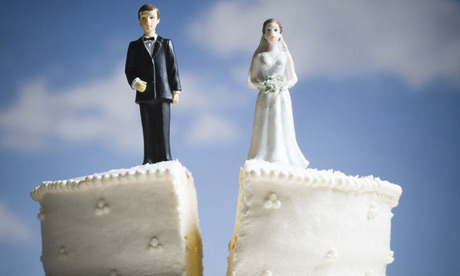
Divorce is hard (and expensive). You’ve been warned, so don’t say, ‘I wish someone would have told me how hard it was going to be before we separated’.
There are numerous reasons why people get divorced. Some reasons may seem more justified such as one of the spouses is cheating, carrying out criminal activity in the home, alcoholic, or abusive. Some reasons are as simple as we just don’t love each other anymore.
Some people feel very strongly that when you make a commitment ‘until death do you part’ or some equivalent, that vow should be taken seriously and literally. Other people feel strongly that we only live once and life is too short to spend it being unhappy.
Everybody is different and it’s not fair for an outsider to judge who should have tried harder to make their marriage work and who was right to walk away when they did. Keep in mind that a lot of people are divorced who didn’t want to be. Their spouse ended the marriage and put them in a situation that they never wanted. Judging them for the situation they are in only makes everything harder.
Regardless what your personal beliefs on divorce are, we can probably agree that those who are going through a divorce will be in for a difficult transition. It will be a challenging adjustment for everyone involved, including the person who initiated the separation. Freedom from an unhappy existence comes at a price.
For example, a woman who has broken free from her verbally abusive husband may feel liberated and confident, but it doesn’t mean everything about being independent is rainbows and butterflies. The same applies for a man who leaves a loveless marriage after twenty years of trying every type of counselling available. He may feel grateful to be finally free to find true love, but starting life over has its challenges too.
When children are involved it is even more painful for everyone. Divorce may have been the best, or the only, option given the circumstances of the marriage, but justified or not, children will still be hurt by it.
 Of course, there are many well-adjusted children of divorce who have been able to blossom with the love of both parents and possibly two fantastic step-parents. There are also many happy and thriving children of single parents. But in my experience, even the stable, successful children who intellectually understand that the divorce of their parents was necessary and resulted in a better environment for them to grow up in, have a tiny part of their emotional inner child that still wishes their parents didn’t have to get divorced.
Of course, there are many well-adjusted children of divorce who have been able to blossom with the love of both parents and possibly two fantastic step-parents. There are also many happy and thriving children of single parents. But in my experience, even the stable, successful children who intellectually understand that the divorce of their parents was necessary and resulted in a better environment for them to grow up in, have a tiny part of their emotional inner child that still wishes their parents didn’t have to get divorced.
Even if we all knew how to communicate respectfully and skilfully to resolve conflict, if we were all emotionally mature enough to contribute to a marriage in an equal and unconditionally accepting way, and if we were all perfectly compatible for our entire lifetime, I’m sure there would still be divorces. Why? Because we don’t have a crystal ball to predict the future and know that someone is going to become, as an example, a raging alcoholic when they are fifty years old.
Bonus warning: marriage is a lot of work. It is not all good times and you will be challenged to grow, be flexible, and to compromise. If you have any doubts about the person you are thinking about marrying, listen to your instincts. If there are any red flags, don’t brush them off. If there are already problems with respect, communication, and division of responsibility, it’s best to walk away early or work them out in counselling prior to making a commitment to marry someone or to have children with them.
June 18, 2013
The UK Tour
We are back from our UK tour. I took over three hundred photos, so here are just a few to give you a taste of what it was like.
England
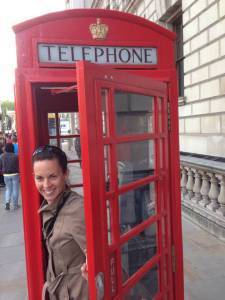
London Calling

Camden Loch, Regent’s Canal, London

Camden Market, London

Nottingham, England. Searching for Robin Hood

London Underground

Piccadilly Circus, London

Stonehenge

Tower Bridge, London

Monet-esque photo, Hyde Park and Kensington Gardens, London
Scotland

The Loch Ness Monster, Fort Augustus Scotland

Uruquart Castle, Scotland

Rainbow near the Scotland/England Border

Highland Cows, Scottish Highlands

Crail, Scotland

Crail Harbour, Scotland

Crail Harbour, Scotland

Crail Harbour, Scotland

The Watch House, Crail, Scotland

Edinburgh Castle

Edinburgh Castle, Scotland

St Andrews Pipe Band Beating the Drum
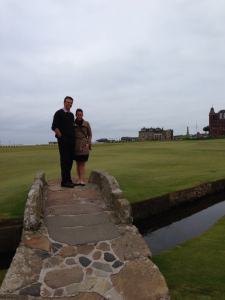
Swilcan Bridge, St Andrews Scotland

Chariots of Fire Beach St Andrews, Scotland
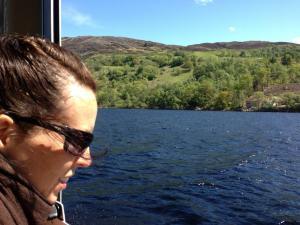
Looking for the Loch Ness Monster, Loch Ness, Scottish Highlands

Urquhart Castle, Scotland

View from the Watch House Crail, Scotland

Himalaya Course St Andrews, Scotland

Edinburgh Castle

Scottish Highlands

Scottish Highlands
Ireland

Ring of Kerry, Ireland

Ring of Kerry, Ireland

Ring of Kerry, Ireland

Ring of Kerry, Ireland

Guinness Brewery, Dublin Ireland

Bed and Breakfast in Dublin, Ireland
Ring of Kerry, Ireland

From the Irish Ferries arriving in Dublin, Ireland

Cheers from Guinness, Dublin Ireland
May 14, 2013
MY PATHWAY TO BOOKS: MONTH OF CONTEMPORARY EVENT
I’m excited to announce that I am one of the authors being profiled on the popular MY PATHWAY TO BOOKS blog for their awesome MONTH OF CONTEMPORARY this July.
Click on the image to follow their blog for lots of fun reviews, author interviews, and giveaways.







May 3, 2013
Enjoying The Journey
When I worked as a social worker, one of the programs our agency provided was a summer day camp for children who were, for various reasons, not be able to attend community centre programs. We went to the zoo one day and one of my favourite kids was acting particularly anxious. He was running ahead, pulling at my hand to hurry us along, and on the verge of tears if the group paused to look at an exhibit.
I told him we had all day and he didn’t have to worry about missing anything, but he was desperate to get to the next exhibit. As soon as we all arrived at the next exhibit, he was off and running again. He desperately wanted to see the wolves, but barely even glanced at them before he checked the map to see what was coming up.
We all tried to slow him down so he could enjoy the moment and soak it all in, but the excitement of everything that was offered at the zoo was overloading his system.  When we passed the tigers, all the other children stopped at the fence and observed as the trainer feed the big cats. My student wasn’t even paying attention to what was happening right in front of him. He only wanted to know what was next, even though he’d been looking forward to seeing the tigers.
When we passed the tigers, all the other children stopped at the fence and observed as the trainer feed the big cats. My student wasn’t even paying attention to what was happening right in front of him. He only wanted to know what was next, even though he’d been looking forward to seeing the tigers.
I eventually took the map away from him, but it didn’t slow him down. Every time we got somewhere, he just wanted to get to the next somewhere. At the end of the day, when the tour was finished, he cried because it was over. He cried a lot, and he wanted to go back to do it again.
People ask me all the time to help them achieve their goals. They set their personal, work, and financial goals and assume that when they reach them they will finally be happy. People also come in all the time wondering why after they achieved all their goals, they’re still not happy.
Achieving goals is not a bad thing. Challenging yourself with novel aspirations that are slightly outside your comfort zone is the best way to learn and grow. However, it’s not the achieving that creates the happiness; it’s the striving. If we aren’t paying attention during the journey, we miss the point.
If you ask an angsty existential teen the meaning of life, he will say that in its simplest terms we live to pass on our DNA to ensure the survival of our genetic pool. Then we die.
If that’s the case, why is everyone trying to rush the process?
Goal driven people want to get to the top of the mountain, and they want to get there first, but what if the top of the mountain is where it all ends?
People rush up the path assuming that ultimate success and happiness can be found there. They ignore signs and avoid the other people along the path only to be told when they reach the peak, “Okay, it’s over”. The thing they feel at that point is regret that they didn’t take more time and pay more attention to all the things that happened along the way.
It’s true that everyone is on a slightly different path. Some are paved highways and some are muddy pothole filled back country foot trails. But we are all ultimately going to end up in the same place.
If we don’t like where we currently are, we can get on or off any given path at the next intersection or fork in the road. Find a road that makes you want to meander and enjoy the scenery. Nobody knows how long their particular journey to the top of the mountain is going to take, but whether it is destined to be short or long, we might as well slow down and enjoy the trip.






















